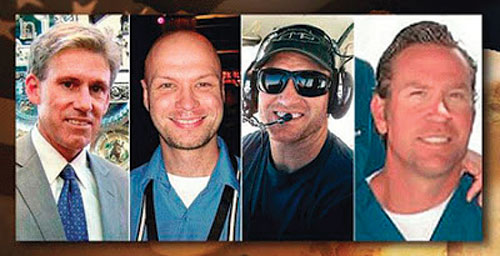.jpg)
Ambassador J. Christopher Stevens, Foreign Service Officer Sean Smith and two other Americans were killed September 11, 2012 in Benghazi, Libya. There was enough blame to go around to smear everyone involved, but what really happened will never be clear.
Patricia Smith, the ambassador’s mother, pleaded for answers. “I just want to know what happened to my son and somebody to admit to what happened, just to admit and say I goofed up; I’m sorry; I made a big mistake. But nobody’s done that. Therefore, it’s going to happen again and again and again . . . because nobody cares enough to do anything about it.”
Is she correct? Were any lessons learned in Benghazi that will enable the U.S. to better understand who is who and what is what in the Syrian conflagration?
David Kirkpatrick, author of the extensive New York Times investigation of the events in Benghazi, wrote that “Benghazi was not infiltrated by Al Qaeda, but nonetheless contained grave local threats to American interests.”
What is needed is the will to act. But will American partisan politics hinder development of an efficient and effective strategy in Syria? Republicans accuse the Obama administration of not bolstering security before the attack, botching the response to it and misleading the public for political gain. The White House blames its initial and inaccurate explanation on “confusion and conflicting information” and that there was “not any deliberate effort to mislead the public.”
In the end, it turns out that much of the violence was indeed fueled by the airing of a video in Egypt on the anniversary of 9/11. The nasty film was produced by a con man in Los Angeles, and was one that insulted Islam and blamed on Americans. It went viral through the Muslim world, and that world erupted.
American diplomat David McFarland was warned of rising threats against Americans two days before the attack in Benghazi. “It is better for you to leave now,” Mohamed al-Gharabi, the leader of the Rafallah al-Sehati Brigade, told the Americans. “We hoped that they would leave Benghazi as soon as possible.”
The United States hoped to build a beachhead against extremists, especially Al Qaeda. It believed it could draw a bright line between friends and enemies in Libya. But who should America consider allies? American aid was thought to buy durable loyalty but the Americans did not know the difference between friends and “allies of convenience” in a culture shaped by decades of anti-Western sentiment.
That challenge now hangs over American involvement in Syria.
Stevens was an experienced Arabist who helped shape the Obama administration’s conviction that it could work with the rebels to build a friendly, democratic government. He also knew Benghazi had a history of violence against Western diplomats. The CIA was assigned to protect the diplomatic staff and gather intelligence about anti-Western terrorists and major militia leaders. With hundreds of small brigades, and fluid and overlapping affiliations, agents often turned to Stevens for advice, because he seemed to know the militia leaders better than any other American expert.
A State Department investigation later concluded that despite his expertise and the CIA.’s presence, “there was little understanding of militias in Benghazi and the threat they posed to U.S. interests.” Now one worries whether that also applies to American strategy in Syria. Do we understand who is who and what they are doing there?
For years, Syria has been ripping itself apart at the artificial seams imposed upon its sectarian populations by the British Mandate. Forces inside and outside the country are tearing away at the figurative and literal bodies and souls of the people. Weapons in abundance have found their way to the streets of Aleppo or Damascus or Hom from assorted and sordid sources. Syria has become a playground for terror and it threatens Israel more seriously now than it did in 1948.
What is taking place in Syria is complicated: even more complicated than the maneuverings in Libya. The Syrian opposition is a puzzle of misfitting pieces. It is multi-national as well as multi-location with segments inside and outside of the country. There are Shi’a, Sunni, Salafi, and other sects involved, each with its warlord and agenda, along with Saudi Arabia, Qatar and other Gulf countries. Not to mention Iran. Other affected countries are Lebanon, Turkey, Jordan and even Egypt. Israel is in the cross-hairs.
If nothing else has been learned from Benghazi, at least the importance of removing American targets has been. As civil crisis threatens Beirut and war rages in South Somalia, The U.S. is asking non-essential personnel to leave. In the past week and a half alone, two deadly bombs in Beirut killed at least a dozen people. The sectarian divides so visible in Syria are infecting the Levant, giving way to a wave of bombings and terror attacks. So who do we work with toward peace? Who are friends? Who are our “allies of convenience?”
If we knew the answer, we might be able to move toward peace. Until then, we need to watch our backs.
By Maxine Dovere













